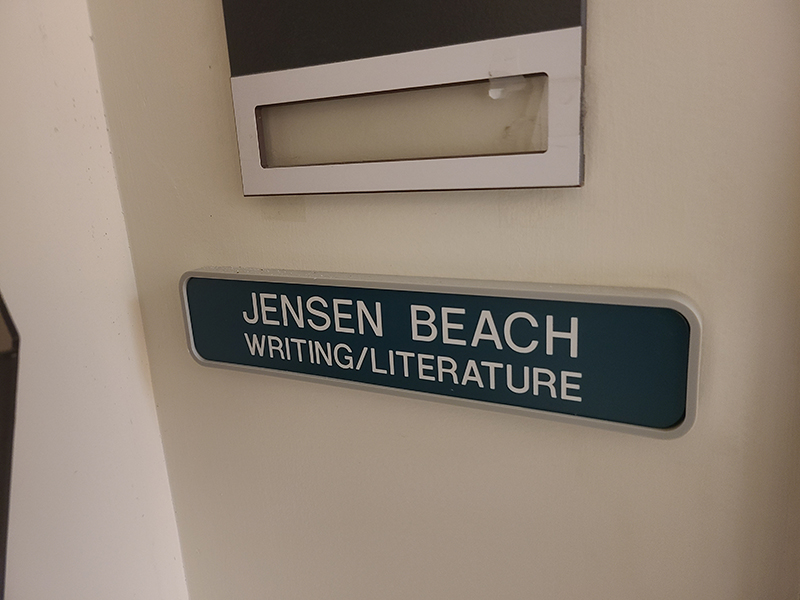Johnson State College’s Education Department is in the midst of an extensive curricular overhaul that will radically transform its teacher training program.
Those changes will affect every student enrolled in teacher education at the college, including all EDP and graduate students.
The new curriculum is based on a whole new notion of teaching. “New demands are being placed upon our schools and there is a real transformation that is occurring in Vermont schools. Our teacher education program needs to keep up with and be ahead of that curve,” said Dean of Academic Affairs Daniel Regan. “One of the main drivers of change in our schools is what’s called the Common Core State Standards which are soon to be implemented, are being discussed around the state, and are going to provide a whole new approach to teaching and learning in the K-12 environment.”
With so many changes in teaching, the decision was made to rewrite the entire curriculum. “We started at the very beginning and constructed what’s called a theoretical frame work that is a set of four particular theories about how to prepare people to teach,” Associate Professor of Education David McGough said. “So we could make sure that every course was aligned and coherent with the new expectations. Fifteen new courses have been developed.”
As educators teach students working towards the profession of teaching, the Vermont Standards Board for Professional Educators determines by accreditation if they are doing things properly. The VSBPE shifts its standards and requirements as needed. “So as the field changes and as our accrediting agency sets up new standards, what we have to do is make sure that the curriculum prepares students to meet those standards,” McGough said.
The accreditors’ review team will be arriving next spring. “We will have to have this all in place and written up,” McGough said. “We are anticipating that the review team will be pleased with what they see and provide full accreditation for our teacher education programs. I fully expect that we will be fine in our accreditation.”
The federal government involvement in schools with the No Child Left Behind Act has for the first time in the United States brought about a core curriculum with a common set of standards that all elementary students learn in English and Math emphasized by inquiry and project-based learning and the integration of foundational skills with real content knowledge. Vermont is one of 45 states having adapted the Common Core.
Five faculty members – McGough, Professor of Education Darlene Whitte, and Assistant Professors of Education Perry LaRoque, Regina Ritscher, and Kathleen Brinegar – spent one year writing the entire theoretical framework and designing the new program and then spent last year writing the new curriculum. “They have put in a very strong effort to get this done,” McGough said. “It has been very quick.”
Students entering in the fall 2012 will be entering the new program. Everyone who is currently a student will step sideways and continue on in their program with courses from the new curriculum. “They shouldn’t really be imposed or blocked,” McGough said. “If they are missing one three-credit course there will be another three-credit course they can take.”
McGough noted that the courses are going to be more rigorous, involving more research, more writing, and more reading. Students will be more challenged. There will be more field work throughout the program. The practicums will increase and are becoming more formal.
To earn a license recommendation, each teacher education candidate produces a huge portfolio that summarizes their learning throughout their program, which is done now after students finish their program at the end as a capstone thesis.
In the new curriculum, two-thirds of this work will be done within the courses as they go along. In this respect, finishing the program will be easier and the process more efficient. The courses are aligned with prerequisites and will be taken in order in a regular sequence.
“We are using a professional learning community approach, which will carry on course to course to course, and through their practicums they should get to know the other students pretty well as budding professionals,” McGough said. The students will begin to carry assignments from course to course and the progression through the courses will be connected.
Partnership schools will be established around the state. Students will be placed for their practicums or student teaching in these partnership schools, and site-based courses will be run at the schools instead of on campus.
The students will get to know certain schools and the faculty will know JSC students. “One of the goals here is to deepen partnerships with selected schools that are receptive to our students, where our students can make a contribution and whose personnel will develop the skills of our aspiring teachers,” Regan said.
An undergraduate student will spend a large amount of time out in the work world while earning credits. Students will graduate knowing the language of professionals, using professional behavior and dressing like professionals.
The fulltime faculty is preparing for the change through self-study and is working with the entire part- time faculty to prepare to teach new courses. A retreat is planned for this summer to work with part-time faculty to help them understand the new direction.
“The faculty has been very supportive and the administration has been very supportive,” McGough said. “We are very grateful to have everybody’s help. It is going to be a big switch. It takes the whole team to make something this big happen.”



